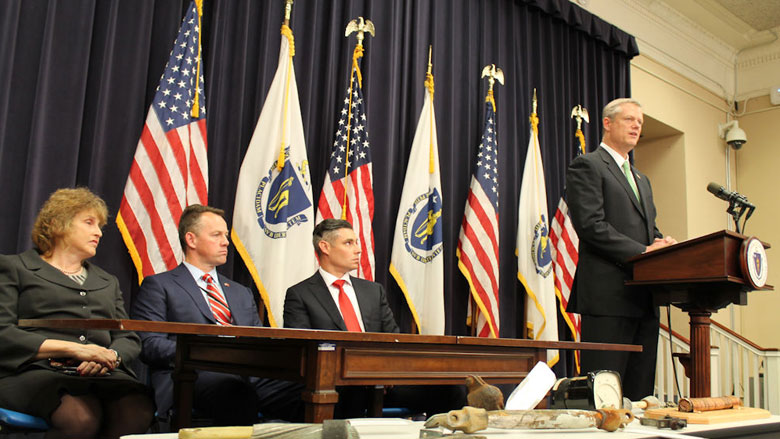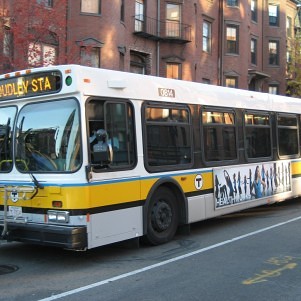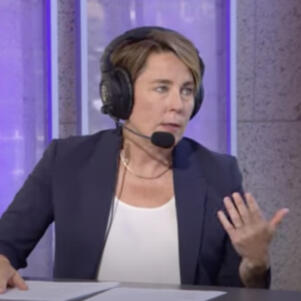Baker: Privatization, pensions among ‘ton of work’ ahead at MBTA
By State House News Service | July 21, 2016, 6:51 EDT
 Gov. Charlie Baker (far right) joined Transportation Secretary Stephanie Pollack (left), MBTA General Manager Brian Shortsleeve(middle) and Chief Operating Officer Jeff Gonneville (right) Wednesday to discuss the progress made by the T’s fiscal oversight board one year after its establishment. [Photo: Antonio Caban/SHNS]
Gov. Charlie Baker (far right) joined Transportation Secretary Stephanie Pollack (left), MBTA General Manager Brian Shortsleeve(middle) and Chief Operating Officer Jeff Gonneville (right) Wednesday to discuss the progress made by the T’s fiscal oversight board one year after its establishment. [Photo: Antonio Caban/SHNS] STATE HOUSE — Presenting a broad reform agenda for the second year of the MBTA’s Fiscal and Management Control Board’s existence, Gov. Charlie Baker said the agency should shift its pension management to the state’s fund managers and continue to look for opportunities to privatize services.
“The old way of doing things at the T is no longer viable or sensible,” Baker told reporters at a press conference on Wednesday. He said, “The T’s pension system is in freefall.”
Baker said companies should be allowed to submit “unsolicited proposals” for improvements at the agency, and the T would begin relying on the state’s procurement process for millions of dollars worth of purchases.
“The T was and still is in very tough shape,” the governor said, adding that he believes the agency was in worse condition when he inherited it than Harvard Pilgrim Health Care, the insurer he used to run, was in before it was placed into receivership.
The governor said that for 15 years the T’s operating expenses had risen by about 5 percent a year despite virtually no increase in its ridership numbers. The agency has also remained mired in paper-driven administration at a time when most business operations are automated and online.
Baker plans to make a proposal in January, during the next legislative session, to move the MBTA’s pension – now overseen by a mix of union and management officials – under the management of the Pension Reserves Investment Management Board. An administration official said officials would review what legislation might be required.
“A $1.5 billion system with a $1 billion shortfall that is losing $90 million a year in assets. This really shouldn’t be a surprise since eligible employees paid in about $47,000 in contributions and take out $1.65 million in pension and health care benefits,” Baker said.
Not a major facet of his 2014 campaign, dysfunction at the T was thrust on Baker weeks after taking office when bitter cold and nine feet of snow pushed the aged subway system past the breaking point.
Reliant on regular bailouts through the state budget, the agency employs 6,500 people – nearly all union – and has boasted well over 1 million rides per weekday in recent years with commuter rail service stretching from Newburyport to Rhode Island and a busier web of bus and subways in the core of Metro Boston.
A chief concern of the control board has been balancing the competing goals of reducing the $7.3 billion state of good repair deficit and finishing long-sought expansion projects such as the Green Line Extension and South Coast Rail, which would cost a combined roughly $5.7 billion according to the latest estimates.
Baker and his transportation secretary, Stephanie Pollack, have placed their emphasis on fixing the existing network of roughly 1,000 buses, five separate subway and trolley lines, including one whose cars date back 70 years, commuter rail and ferries.
The governor on Wednesday pointed to the findings of a task force he assembled last year as he reiterated his dismissal of the idea that additional state revenue sources are needed for the T, which has a roughly $2 billion operating budget.
“What they did not say is that the T was underfunded. It wasn’t. It isn’t. It won’t be. What it was was poorly led and horribly managed. There are a lot of terrific people working at the T but it’s still broken,” Baker said.
While Democrats in the Legislature – along with Republican Sen. Patrick O’Connor – advanced an income surtax on high earners this May to raise $1.9 billion for transportation and education, Baker has taken a dim view of new taxes. The proposed constitutional amendment could appear on the 2018 ballot when Baker appears likely to be running for re-election.
“Let’s focus on the task in front of us,” Baker said Wednesday when asked about whether he would look into the revenue question.
The T is draining more revenue from its users.
The control board this year raised fares an average of 9.3 percent, generating an estimated $42 million that will be devoted to capital improvements.
Baker suggested the T hire additional talented people, and “actively seek out private partners.” He said 260 employees had taken voluntary retirements. The T has hired bus drivers while seeking to reduce its overhead on administrative tasks.
Meeting nearly every week and receiving more than 270 staff presentations over the past 12 months, the control board regularly unearths major problems at the agency. The board has received reports of security lapses in a money room that handles nearly $200 million annually, a persistent inability to spend debt-financed capital dollars that the agency has the authorization to spend, and ballooning budgets and timelines for major expansion projects of Green Line trolley service to Medford and commuter rail to the South Coast.
“They are the five hardest-working volunteers anywhere,” Baker said, adding “These people have jobs, right?”
Led by Joseph Aiello, an executive at Meridiam Infrastructure, the five-member unsalaried control board consists of Lisa Calise, the chief financial officer at Perkins School for the Blind; Brian Lang, president of the hospitality union UNITE HERE Local 26; Steve Poftak, executive director of the Rappaport Institute for Greater Boston at Harvard’s Kennedy School; and Monica Tibbits-Nutt, executive director of the 128 Business Council, which offers transportation options for the Route 128 corridor from Woburn to Needham.
“People have said to me all year long, ‘Boy, there’s sure a lot of bad news that comes out of this process,’ and the answer to that is, ‘Yeah because every week the FMCB meets publicly,'” Baker said, continuing, “Part of the reason we’re in the place we’re in is because for years there was no transparency around what was going on at the T, and people used a variety of games and gimmicks to make up for the fact that some of the structural reforms we’re pursuing now didn’t happen.”
The control board, whose members were all appointed by the governor, is set to expire June 30, 2018, and could continue another two years beyond that if the board and the governor agree on that extension.
Asked whether the control board should be made permanent, Baker said that is something “all of us have talked about a lot,” while acknowledging that officials seeking the “right model” for long-term management of the transportation authority have not yet determined “what that thing should look like.”
Before establishment of the control board the T was overseen by the Massachusetts Department of Transportation Board of Directors, which meets monthly, and has responsibility for highways, state airports and the Registry of Motor Vehicles.
Speaking before a display of old and weathered MBTA equipment, the governor delivered news of yet another problem within the T’s cash-handling operations. Baker said “someone cut sunroofs into two of the armored vehicles used by the T to transport money.
“The doors to the money room were rarely locked. No one wore the required uniform. And lunchboxes were never inspected,” Baker continued. He said much of the equipment in service is older than his 88-year-old father, who was assistant transportation secretary in the Nixon administration.
As it has with other MBTA operations deemed mismanaged and outside the core transportation mission, T leadership has moved ahead on plans to outsource cash-handling at the agency. Those moves – aided by the Legislature’s decision to free the T from privatization constraints for three years – has riled unions representing bus drivers, the mechanics that fix fare gates, and Transit Police officials.
“I don’t care if a service is provided publicly or privately. What I care about is performance, productivity,” and that public money is “well spent,” Baker said.
“Privatization is not a magic wand. There is no magic wand to cure the lack of investment of the past 20-plus years. And privatization certainly does not guarantee cost savings or improved service for riders,” James O’Brien, president of the Boston Carmen’s Union said in a statement on Wednesday. “Three weeks ago, the Boston Carmen’s Union put forth a proposal that would save the MBTA $24 million in the next four years, and over $190 million over the next two decades. We have yet to receive a response from anyone on the MBTA Fiscal and Management Control Board or within MBTA leadership. At the same time, we have seen a consistent focus by the MBTA leadership to conduct audits and air disrespectful and exaggerated allegations that trash the reputations of MBTA workers.”
O’Brien also praised the control board.
“They inherited a broken system that lacked investments and had been neglected by management for decades – I do not envy the decisions they are forced to make each day,” O’Brien said. “While we will not always agree, we all understand that it is our shared responsibility to put riders first.”
At the press conference, Pollack noted that only a “handful” of managers are not themselves in unions. Of the roughly 6,500 employees at the agency somewhere between 100 and 200 are nonunion, she said.
While overall painting a bleak picture of the transit agency and forecasting a long turnaround process, Baker pointed to the T’s swift recovery from a fire on the Longfellow Bridge in June to show how its operations have grown more “nimble.”
Around 2 a.m. on June 24 a fire in a power cable on the bridge, which is under reconstruction and carries the Red Line between Boston and Cambridge, briefly required shuttle buses for three stations between Kendall Square and Park Street before service was resumed at 6:47 a.m.
If the fire had happened last year, it would have been “a mess” with shuttle buses running between eight stations through the morning rush hour, Baker said, crediting fast repairs and the installation of power supply switches that allow shorter segments of the Red Line to be shut down at a time.
The governor highlighted strides the T has made on boosting its own advertising revenue, and said improvements should be made that are visible to riders.
Baker also said the T is at the beginning of an upswing in the turnaround process.
“There are many talented, committed and dedicated people working at the T. They have been badly let down by a culture from the top to the bottom of the organization that’s allowed the T to deteriorate operationally and financially over a very long period of time,” Baker said. He said, “Climbing out of this mess will take time and a ton of work. I think on that we can all agree. But it will also take a change in attitude at every level throughout the T.”
— Written by Andy Metzger
Copyright State House News Service











